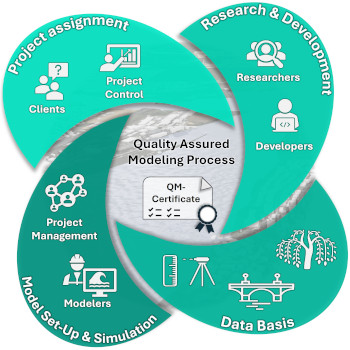
Numerical flow models have become a standard tool in hydraulic engineering practice over the past decades. Rapid developments, particularly in terms of data availability and computing power, allow for and require increasingly sophisticated and complex models. This enables the generation of large datasets and detailed results at an ever-faster pace.
This development raises the question of how the quality of modeling and its results can be adequately tested and ensured. Numerous factors and influences play a role here, which can vary significantly depending on the project. These can include the experience and knowledge of the individual modelers, the type of review by the project management, as well as data availability or the thoroughness of the project order and supervision by the clients.
The need for defined concepts for quality assurance (QA) and quality management (QM) is therefore evident. However, directly specifying quantitative quality criteria or error measures is not feasible due to the varying conditions and requirements of each modeling project. Thus, a systemic approach is necessary, balancing standardized mechanisms with sufficient flexibility for diverse projects.
In cooperation with the DWA (German Association for Water, Wastewater and Waste) Working Group WW-1.7, such methods and concepts are being developed with the aim of providing recommendations for quality assurance and evaluation to all project participants – from clients to modelers. These are not intended to be another modeling guide but rather a comprehensive QA/QM aid for the process chain from project initiation to archiving.
Currently, as part of our research, we are conducting an international survey on the state of QA/QM in flow modeling. We invite you to participate via the link below:
https://www.soscisurvey.de/QMQS_in_HN_Modellierung/
